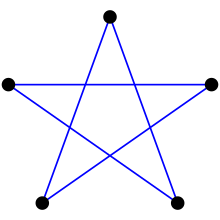Complex polygon
The term complex polygon can mean two different things:
- In geometry, a polygon in the unitary plane, which has two complex dimensions.
- In computer graphics, a polygon whose boundary is not simple.
Geometry
In geometry, a complex polygon is a polygon in the complex Hilbert plane, which has two complex dimensions.[1]
A complex number may be represented in the form , where and are real numbers, and is the square root of . Multiples of such as are called imaginary numbers. A complex number lies in a complex plane having one real and one imaginary dimension, which may be represented as an Argand diagram. So a single complex dimension comprises two spatial dimensions, but of different kinds - one real and the other imaginary.
The unitary plane comprises two such complex planes, which are orthogonal to each other. Thus it has two real dimensions and two imaginary dimensions.
A complex polygon is a (complex) two-dimensional (i.e. four spatial dimensions) analogue of a real polygon. As such it is an example of the more general complex polytope in any number of complex dimensions.
In a real plane, a visible figure can be constructed as the real conjugate of some complex polygon.
Computer graphics

In computer graphics, a complex polygon is a polygon which has a boundary comprising discrete circuits, such as a polygon with a hole in it.[2]
Self-intersecting polygons are also sometimes included among the complex polygons.[3] Vertices are only counted at the ends of edges, not where edges intersect in space.
A formula relating an integral over a bounded region to a closed line integral may still apply when the "inside-out" parts of the region are counted negatively.
Moving around the polygon, the total amount one "turns" at the vertices can be any integer times 360°, e.g. 720° for a pentagram and 0° for an angular "eight".
References
Citations
- Coxeter, 1974.
- Rae Earnshaw, Brian Wyvill (Ed); New Advances in Computer Graphics: Proceedings of CG International ’89, Springer, 2012, page 654.
- Paul Bourke; Polygons and meshes:Surface (polygonal) Simplification 1997. (retrieved May 2016)
Bibliography
- Coxeter, H. S. M., Regular Complex Polytopes, Cambridge University Press, 1974.